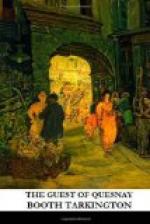CHAPTER XIX
He looked old and tired and sad; it was plain that he expected attack and equally plain that he would meet it with fanatic serenity. And yet, the magnificent blunderer presented so fine an aspect of the tortured Olympian, he confronted us with so vast a dignity—the driven snow of his hair tousled upon his head and shoulders, like a storm in the higher altitudes—that he regained, in my eyes, something of his mountain grandeur before he had spoken a word in defence. But sympathy is not what one should be entertaining for an antagonist; therefore I said cavalierly:
“This is Mr. Ward, Professor Keredec. He is Mrs. Harman’s cousin and close friend.”
“I had divined it.” The professor made a French bow, and George responded with as slight a salutation as it has been my lot to see.
“We were speaking of your reasons,” I continued, “for bringing Mr. Harman to this place. Frankly, we were questioning your motive.”
“My motives? I have wished to restore to two young people the paradise which they had lost”.
Ward uttered an exclamation none the less violent because it was half-suppressed, while, for my part, I laughed outright; and as Keredec turned his eyes questioningly upon me, I said:
“Professor Keredec, you’d better understand at once that I mean to help undo the harm you’ve done. I couldn’t tell you last night, in Harman’s presence, but I think you’re responsible for the whole ghastly tragi-comedy—as hopeless a tangle as ever was made on this earth!”
This was even more roughly spoken than I had intended, but it did not cause him to look less mildly upon me, nor was there the faintest shadow of resentment in his big voice when he replied:
“In this world things may be tangled, they may be sad, yet they may be good.”
“I’m afraid that seems rather a trite generality. I beg you to remember that plain-speaking is of some importance just now.”
“I shall remember.”
“Then we should be glad of the explanation,” said Ward, resting his arms on my table and leaning across it toward Keredec.
“We should, indeed,” I echoed.
“It is simple,” began the professor. “I learned my poor boy’s history well, from those who could tell me, from his papers—yes, and from the bundles of old-time letters which were given me—since it was necessary that I should know everything. From all these I learned what a strong and beautiful soul was that lady who loved him so much that she ran away from her home for his sake. Helas! he was already the slave of what was bad and foolish, he had gone too far from himself, was overlaid with the habit of evil, and she could not save him then. The spirit was dying in him, although it was there, and it was good—”
Ward’s acrid laughter rang out in the room, and my admiration went unwillingly to Keredec for the way he took it, which was to bow gravely, as if acknowledging the other’s right to his own point of view.




